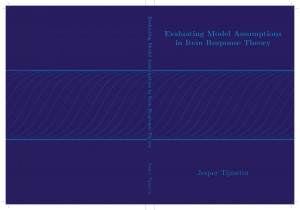 Department of Methodology and Statistics
Department of Methodology and Statistics
Faculty of Social Sciences
Utrecht University
Supervisors:
Prof. P.G.M. Van der Heijden, Prof. K. Sijtsma, & Dr D.J. Hessen
On November 15th 2013, Jesper Tijmstra defended his thesis entitled
Evaluating model assumptions in Item Response Theory
 Summary
Summary
To ensure that conclusions drawn using item response theory models are valid (e.g., inferences about a job candidate’s ability level, a client’s level of depression, or a survey respondent’s attitude), researchers have to be confident that the statistical assumptions made by the model are (approximately) correct. In this project, new tools for the evaluation of statistical model assumptions in item response theory (IRT) are developed. In particular, statistical tests and procedures for the evaluation of latent monotonicity and invariant item ordering are developed, evaluated using simulation studies, and applied to empirical data. Both frequentist and Bayesian approaches to evaluating these model assumptions are considered and compared. Since these assumptions are shared by both parametric and nonparametric IRT models, the tests developed in this project can help users determine whether it may or may not be appropriate to use an IRT model to analyze the data.
Project
Constant latent odds-ratios models for the analysis of discrete psychological data
The main objective of this project is developing statistical procedures for Constant Latent Odds-Ratios models (CLORs) for dichotomous item scores. Since under dichotomous CLORs models the total score, i.e., the unweighted sum of the item scores, is a sufficient statistic for the latent variable, sound statistical procedures for estimation and goodness of fit assessment are readily attainable. The development of such procedures will make the CLORs models available for practical use. Furthermore, the characteristic assumption of constant latent odds-ratios will be used to define new models for polytomous item scores.
This project was financed by Utrecht University
